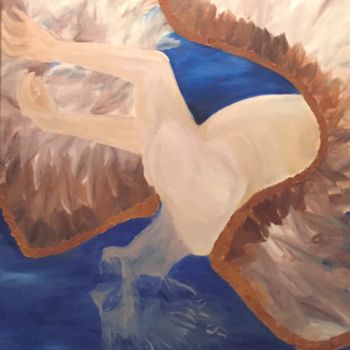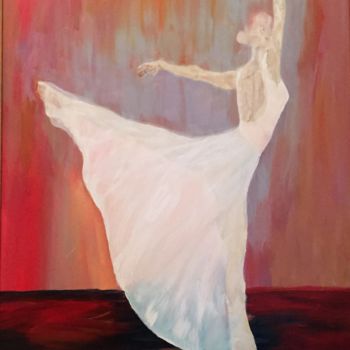



Let us know if you would like to see more photos of this artwork!
- Back of the work / Side of the work
- Details / Signature / Artwork's surface or texture
- Artwork in situation, Other...
SuperEgo (2018) Painting by Eliza Matica
More info
- Packaging All artworks are shipped with a premium carrier, carefully protected and insured.
- Tracking Order tracking until the parcel is delivered to the buyer. A tracking number will be provided so that you can follow the parcel in real-time.
- Delay Most packages are delivered worldwide within 1 to 3 weeks (Estimate)
- Customs not included The price does not include customs fees. Most countries have no import tax for original artworks, but you may have to pay the reduced VAT. Customs fees (if any) are to be calculated on arrival by the customs office and will be billed separately by the carrier.
More info
- Trackable Online Certificate of Authenticity Authenticity Certificates can be verified online at any moment by scanning the artwork code.
- Artist Value Certification Experts study the work and career of an artist then establish an independent and reliable average price value. The average price value situates the artist on a price range for a given period. The experts may also be asked to establish a more precise estimate for a particular work.
More info
100% secure payment with SSL certificate + 3D Secure.
More info
This image is available for download with a licence
Sold by Eliza Matica
-
Original Artwork
Painting,
Oil
on Canvas
- Dimensions Height 46.1in, Width 53.9in
- Categories Paintings under $5,000
Thus a child's super-ego is in fact constructed on the model not of its parents but of its parents' super-ego; the contents which fill it are the same and it becomes the vehicle of tradition and of all the time-resisting judgments of value which have propagated themselves in this manner from generation to generation.
The super-ego aims for perfection. It forms the organized part of the personality structure, mainly but not entirely unconscious, that includes the individual's ego ideals, spiritual goals, and the psychic agency (commonly called "conscience") that criticizes and prohibits their drives, fantasies, feelings, and actions. "The Super-ego can be thought of as a type of conscience that punishes misbehavior with feelings of guilt. For example, for having extra-marital affairs."[33] Taken in this sense, the super-ego is the precedent for the conceptualization of the inner critic as it appears in contemporary therapies such as IFS.
The super-ego works in contradiction to the id. The super-ego strives to act in a socially appropriate manner, whereas the id just wants instant self-gratification. The super-ego controls our sense of right and wrong and guilt. It helps us fit into society by getting us to act in socially acceptable ways.
The super-ego's demands often oppose the id's, so the ego sometimes has a hard time in reconciling the two.
Freud's theory implies that the super-ego is a symbolic internalisation of the father figure and cultural regulations. The super-ego tends to stand in opposition to the desires of the id because of their conflicting objectives, and its aggressiveness towards the ego. The super-ego acts as the conscience, maintaining our sense of morality and proscription from taboos. The super-ego and the ego are the product of two key factors: the state of helplessness of the child and the Oedipus complex. Its formation takes place during the dissolution of the Oedipus complex and is formed by an identification with and internalisation of the father figure after the little boy cannot successfully hold the mother as a love-object out of fear of castration. Freud described the super-ego and its relationship to the father figure and Oedipus complex thus:
The super-ego retains the character of the father, while the more powerful the Oedipus complex was and the more rapidly it succumbed to repression (under the influence of authority, religious teaching, schooling and reading), the stricter will be the domination of the super-ego over the ego later on—in the form of conscience or perhaps of an unconscious sense of guilt.
The concept of super-ego and the Oedipus complex is subject to criticism for its perceived sexism. Women, who are considered to be already castrated, do not identify with the father, and therefore, for Freud, "their super-ego is never so inexorable, so impersonal, so independent of its emotional origins as we require it to be in men...they are often more influenced in their judgements by feelings of affection or hostility."However, Freud went on to modify his position to the effect "that the majority of men are also far behind the masculine ideal and that all human individuals, as a result of their human identity, combine in themselves both masculine and feminine characteristics, otherwise known as human characteristics."
Wikipedia
Related themes
Born. Education. Master in philosophy. Back to school. Master in Psychology. Work. Psychotherapist. Painter. We will see...
2018-2019 Postwar Abstract Painting MoMA New York,New York, United States
2001-2005 Master Degree in Psychology Bucharest, Romania
1994-1999 Master Degree Philosophy Bucharest, Romania
All my paintings have in common a mental reality, not a physical one.
I am against painting that is based only on observation and theory, painting as if done by robot, painting that has the safety net of theories in painting.
I want to explain what and how I paint, I will define it as a relationship between a mode of observation (internal and external) and a way of expressing it. This is the answer for which some works need to express the idea of figurative, others go to abstract or symbols and each one needs a different way to be realized.
I do not paint a landscape, idea, theme, in an established pictorial way, I do not follow the theories and clearly established criteria. Depending on the psychological state of what I want to express, then I use one of many modes of expression in painting.
In painting you can use color and size not only according to the physical reality, but also according to the mental reality. I am convinced that everyone had the surprise to find and find in places that have a different outline and other physical and emotional dimensions. After a while, longer or shorter, the fountain from which the water once drank changed its size.
I do not paint with the same emotion, but under an emotional complex, this is why some works are intuitive, others are strongly rationalized.
In each paper I had to tolerate the uncertainty, not knowing where the idea goes, to change the way the subject is played. There were quick endings, but there were also roads that closed and I had to resume and investigate what I want and I like the search.
I tried to formulate what happens when I stand in front of a canvas, without exposing all the "cognitive maneuvers", the interpretation is left to those who regard, the benefit is both.
This is what those who have already started digesting my paintings from the three years since I woke up in painting know this.
So let's see outside what is not foreign to us inside!
-
Nationality:
ROMANIA

- Date of birth : 1974
- Artistic domains: Works by artists with a certified artist value,
- Groups: Certified Artists Romanian Contemporary Artists













